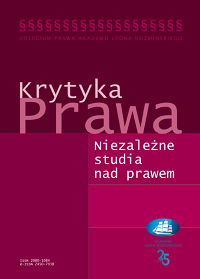A Few Remarks on the Concept
of Secularism and the Judgments
of the European Court of Human Rights
A Few Remarks on the Concept
of Secularism and the Judgments
of the European Court of Human Rights
Author(s): Tomasz FamulskiSubject(s): Law on Economics
Published by: Akademia Leona Koźmińskiego
Keywords: secularism; freedom of religion; European Court of Human Rights; European Convention on Human Rights; Lautsi v. Italy; Leyla Şahin v. Turkey; Kokkinakis v. Greece
Summary/Abstract: The article is divided into two parts. The first part discusses a certain concept ofsecularism, where secularism is considered to be composite of three principles:separation of church and state, freedom of religion, and equality. Subsequently,the European Convention on Human Rights is reflected upon with that conceptof secularism in mind. While it does not warrant separation of church and state,freedom of religion and equality are enshrined in it. Therefore, the Convention maybe considered secularist to an extent. In the second part, three of the European Courtof Human Rights landmark cases are analyzed with regard to secularism. Whilenot much can be said about Kokkinakis v. Greece on its own, the comparison withLeyla Şahin v. Turkey and Lautsi v. Italy allows to point out that appearance of secularism(understood as one of its components – the principle of separation) providesthe Court with a possibility to defer to the doctrine of the margin of appreciationand draw the focus away from the actual violation of the principles enshrined inthe Convention. Finally, it is noted that the only appearance of the concept of secularismas a personal conviction in the Court’s judgment is inconclusive.
Journal: Krytyka Prawa
- Issue Year: 11/2019
- Issue No: 4
- Page Range: 33-50
- Page Count: 18
- Language: English

